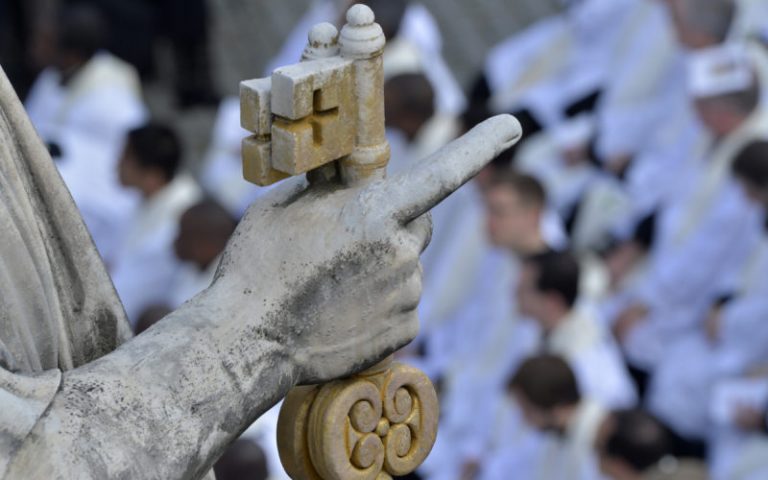Founder’s Quote
November 2, 2018Patrick J. Buchanan: Mass Migration: Mortal Threat to Red State America
November 2, 2018
By Fr Alexander Lucie-Smith, Catholic Herald, Wednesday, 31 Oct 2018
To tell sinners that they have in fact not gone astray is to lead their souls into grave danger

Dr Samuel Gregg has a brilliant article over at Catholic World Report which everyone needs to read. Entitled “A Church drowning in Sentimentalism”, it sums up in just a few words what is wrong with the discourse of the modern Church.
I agree with everything that Dr Gregg has to say, but would like to add my own thoughts as well.
Some years ago, every Catholic college in the world was urged to hold a conference on Natural Law. I was then teaching in a Catholic College in Nairobi and I took part in one such conference. I remember speaking about the universality of Natural Law, and contrasting it with the particularity of cultural insights. While cultural insights could lead to truth (as well as its opposite) they needed the challenge of Natural Law as a corrective. All our customs need to be examined from time to time in the light of Natural Law. Then the conversation moved onto Liturgy and the way the Roman Rite transcends mere time and place, but finds a suitably concordant fit with a variety of cultures. I remember making the point that one did not have to adapt the Mass to our own situation; rather we should adapt ourselves to the timeless truths revealed in the Mass.
In expressing these thoughts, I was developing a thought of the great and good Fr Francesco Pierli, a Comboni missionary, who had said in another forum that the Bible was “a moment in time which illuminates all moments in time.” This is indeed a theological truism, going back to Saint Augustine, but beautifully expressed, it seemed to me, by good Fr Pierli.
Our Protestant brethren in their preaching often work to a set scheme which has as its first movement what they called ‘conviction of sin’. (This is brilliantly sent up by Stella Gibbons in Cold Comfort Farm, where, you may remember, the wedding sermon starts with the memorable words “You are all damned!”) But conviction of sin is not to be dismissed: an essential part of the Christian proclamation, though not its first part necessarily, is the narrative of human failure with which the hearer should be able to identify. This is sometimes expressed by theologians this way: the revelation of God calls us into question. Put another way, Jesus did not come to give us a pat on the back, he came to make us profoundly uncomfortable and to make us realise we all have to change. Or as the great Rowan Williams once put it: “Jesus is not the one who answers our questions, He is the one who questions our answers.” And let us remember that our answers are not very good ones, as the state of the world and the state of our own lives gives ample evidence.
However, the incontrovertible fact that sin exists is one that one hardly dare whisper these days, as Dr Gregg makes clear. After all, we are expected by the world to be in the business of affirming people not challenging them. But affirming people can often involve lying to them, and that is not good. We have to tell the truth, and insist on it, in or out of season, as someone once said. This does take a modicum of guts, however, and can make the preacher unpopular. But the fact remains that truth must be proclaimed and untruth must be challenged. Not all the choices we make are good; many of them are sinful; to tell sinners that they have in fact not gone astray is to lead their souls into grave danger.
Where does this leave us? Two great resources that we have at our disposal are Fides et Ratio and Veritatis Splendor, both encyclicals of Saint John Paul II. Both are calls to humanity to realise that subjectivity is not the last word; there is objective moral truth and that objective truth that we can reach through reason. Both offer opposition to what Benedict XVI so memorably termed the dictatorship of relativism – the absolute (and self-contradictory) belief that all beliefs are subjective.
Like a lot of my contemporaries in the priesthood, I am dismayed that Veritatis Splendor and Fides et Ratio seem so neglected these days. We neglect them at our peril. Just as it was a good idea to hold a symposium on Natural Law a decade or so ago in Nairobi, it might be an idea to hold a conference now on Veritatis Splendor or Fides et Ratio. Perhaps some Catholic college would like to take up that challenge? The alternative, the sentimentalism of which Dr Gregg writes, must not be given a free pass.
_______________________
Alexander Lucie-Smith is a Catholic priest, doctor of moral theology and consulting editor of The Catholic Herald. On Twitter he is @ALucieSmith








